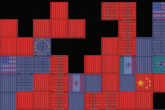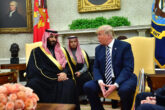December 15, 2020
How Harsh U.S. Sanctions Are Advancing Chinese and Russian Interests Abroad
Over the last four years, harsh U.S. sanctions have pushed Venezuela and Iran further into the arms of traditional U.S. adversaries. China and Russia seek to exploit this collective enmity toward the United States through offering economic lifelines, advanced technology, and military training programs to Caracas and Tehran in defiance of U.S. sanctions. Moreover, the ongoing coronavirus pandemic has provided Beijing and Moscow with more clout in domestic Venezuelan and Iranian affairs as they grow heavily dependent on Chinese and Russian aid. While increased economic entanglement with Venezuela and Iran could strap China and Russia with financial liabilities, it provides coveted geopolitical leverage for greater hedging against the United States and its sanctions regimes.
Harsh U.S. sanctions have pushed Venezuela and Iran further into the arms of traditional U.S. adversaries.
According to the UN World Food Programme, approximately one-third of Venezuela’s total population are food insecure. Although hyperinflation and poor management of national funds are mostly responsible for the country’s economic strife, unilateral U.S. sanctions have exacerbated the situation. Fearing growing domestic support for U.S.-backed political opponent Juan Guaidó and U.S. military intervention, illegitimate Venezuelan leader Nicolás Maduro has consistently rejected humanitarian aid from the United States. Although he later accepted twenty-four tons of medical equipment from the Red Cross in April 2019, China had already seized this opportunity to expand its foreign influence. Between April and December 2019, China provided at least 40 percent of all food imports to Venezuela and a large number of medical supplies to address the ongoing pandemic. However, the China-Venezuela alliance extends beyond humanitarian aid and trade.
Read the full article in The National Interest.
More from CNAS
-
Game Over?
The trade wargame suggests that sustained high tariffs could create leverage and urgency to spur action toward a productive restructuring of the international trade system....
By Emily Kilcrease & Geoffrey Gertz
-
Middle East Security / Energy, Economics & Security
Trump Inks $600 Bn Deal In Saudi Arabia | Musk, Blackrock CEO Flank Trump In Gulf VisitIn today's episode of India Global, U.S. President Donald Trump secured a $600 billion commitment from Saudi Arabia on Tuesday to invest in the United States. NDTV's Gaurie Dw...
By Daniel Silverberg
-
Energy, Economics & Security / Technology & National Security
Tariffs and Tech: An Uncertain RecipeHigher tariffs could prompt American cloud companies to shift more of their capital investments abroad....
By Pablo Chavez
-
Trump Tariffs: How Will U.S. Plans Reshape the Global Economy?
Donald Trump says he's already decided the tariffs he will impose on countries that export goods to America, including the United Kingdom. Channel 4 hears from Emily Kilcrease...
By Emily Kilcrease




